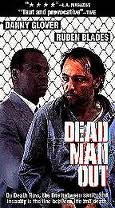
DEAD MAN OUT
US, 1898, 87 minutes, Colour.
Danny Glover, Ruben Blades, Sam Jackson.
Directed by Richard Pearce.
Dead Man Out is a telemovie made for home box office viewers. It is a serious look at prison life, psychological help for prisoners, mental stability and instability, capital punishment. The film is virtually a two-hander drama: a confrontation between a psychiatrist played by Danny Glover, and a condemned prisoner played by Reuben Blades. Tom Atkins is the warder.
The film is strong on dialogue, arguments pro and con the issues. It attempts to make abstract issues concrete. The film uses Montreal locations, especially for the prisons, and has particularly effective death row scenes, solitary sequences. capital punishment sequences.
Direction is by Richard Pearce, director of several telemovies and of films as diverse as Heartland and No Mercy with Richard Gere.
1. A prison film, capital punishment? Human dignity? Telemovie and its intended audience?
2. Montreal locations, the authentic prison, interiors and exteriors, the electric chair? Atmospheric score?
3. The title, expectations, the talk of the wardens at the time of executions and the dead man crossing the yard?
4. The film as a two-hander: a play, strong dialogue, situations secondary to dialogue? Psychological interaction? Themes?
5. Audience response to prisoners, their crimes, background, motivations, proportional punishments? The possibilities of rehabilitation, treatment? Solitary? The psyche of the prisoner? The need for human respect and the treatment of prisoners by society? The repercussions of prison life, death?
6. The portrait of the psychiatrist: entering the prison with him, his skills, motivation, hopes for rehabilitation, understanding of capital punishment? Questions of sanity - and sanity for being executed? His meeting the prisoner, watching him in the cage, assessing him? The number of interviews, the initial resistance, breakthroughs? Listening to the prisoner's story? His own responsibilities? The prisoner's relapse, the continued visits, transference experience? Concern, death row? The dilemma about the prisoner being sane or not - and being executed or not? His plea, the confrontation in the cell, the truth, the razor blade? In danger of death? The relationship with the warden, the warden's presence? Getting out of the cell? His watching the prisoner go to death, the break, the shooting? The effect of the experience on the psychiatrist? The audience sharing his perspective?
7. The prisoner in himself, the cell, the treatment, punishment within the prison, human dignity and lack of dignity? Forfeiting his life? In the death row? Alone, stripped, humiliated? His resistance? His background
and the murders, the encounters with the psychiatrist, resistance, arguments? Guilt and responsibility? Sanity and insanity? The effect on him? The friendship? His relapse and punishment? The sequence of the execution and its effect on him? The crisis In the cell, getting the blade, holding the psychiatrist to ransom? His going to execution, his running and being shot?
8. The warder, his control, the rules, approval of visits or not, handling crises?
9. The sketch of the staff, the wardens, attitudes towards prisoners, responsibilities? Supervision and security?
10. Death row, the picturing of the man going to execution, sitting in the chair, the reality of capital punishment?
11. Abstract themes of prison, crime, rehabilitation, execution? The characters dramatising these issues?